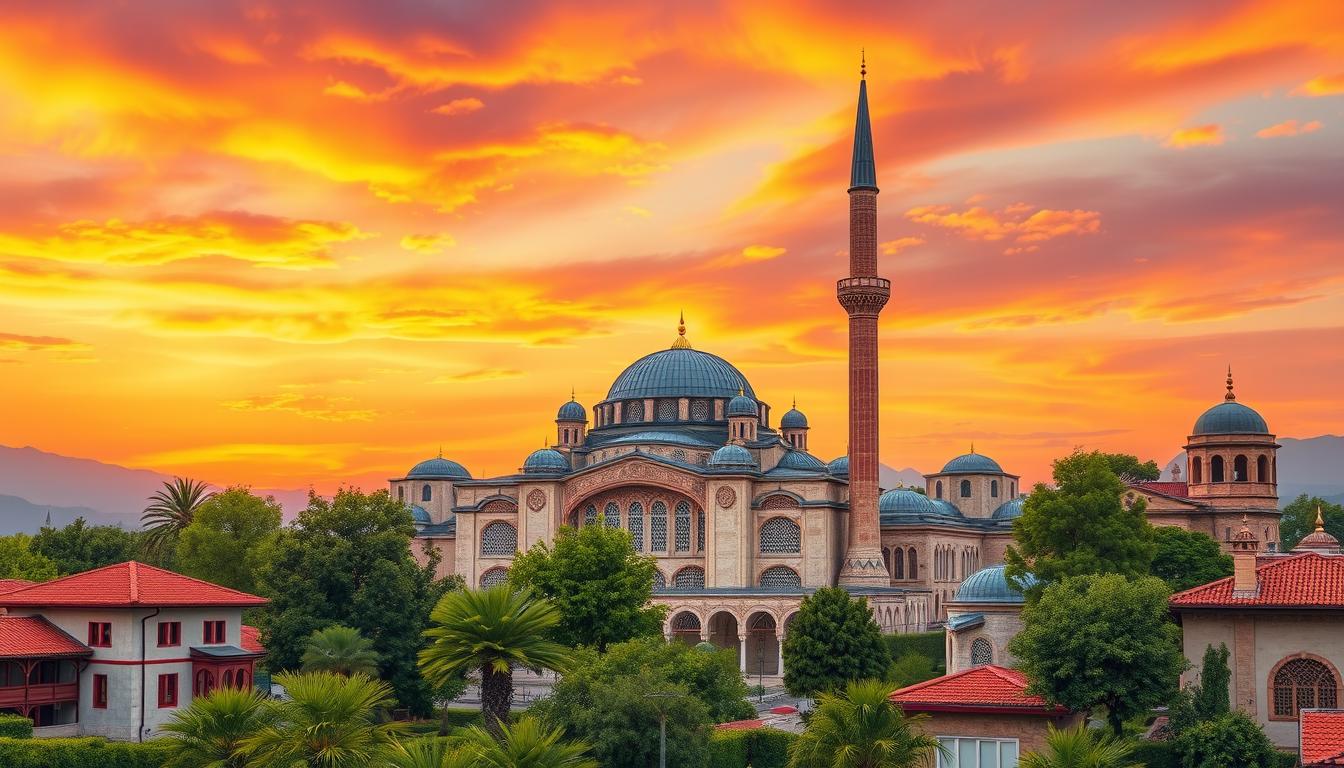Islam in Turkey
Islam is the most common religion in Turkey, with about 94% of people identifying as Muslim. Most, around 90%, are Sunni Muslims, mainly following the Hanafi school. The rest are Shia, including Alevis, Ja’faris, and Alawites, along with Sufi and non-denominational Muslims.
Turkey’s Islamic roots go back to the 11th century with the Seljuk Turks. The Ottoman Empire, which ruled for centuries, greatly influenced Turkey’s Islamic identity and institutions.
Introduction to Islam in Turkey
The history of Islam in Turkey started in the 11th century. The Seljuk Turks began to move into eastern Anatolia then. The Ottoman Empire ruled for centuries, shaping Turkey’s Islamic identity.
Historical Overview of Islam’s Arrival
The introduction of Islam in Anatolia was slow. It started with the Seljuk Turks and grew with the Ottoman Empire. This period brought Islamic culture and values into the region, changing it.
Turkey’s Unique Position as a Secular Muslim-Majority Nation
Even though most people in Turkey are Muslim, it’s a secular state since 1923. Mustafa Kemal Atatürk’s reforms made religion less important in public life. This makes Turkey stand out as a secular Muslim-majority nation. This has greatly influenced Islam’s role in society and politics.
Sunni Islam: The Predominant Branch
In Turkey, Sunni Islam is the main branch of Islam, with 80-90% of Muslims following it. Most Sunni Muslims in Turkey follow the Hanafi school of jurisprudence. This is one of the four major Sunni schools of Islamic law.
The Hanafi school is known for its flexible and practical way of interpreting Islamic teachings. It has a long history in the region. For centuries, it was the main school among the Ottoman ruling elite and the Turkish people.
Hanafi School of Jurisprudence
The Hanafi school of jurisprudence focuses on reason and consensus in the Muslim community. This has appealed to the Turkish Muslim population. They value the Hanafi school’s ability to adapt to local customs and practices.
- The Hanafi school is one of the four major Sunni schools of Islamic jurisprudence, alongside the Maliki, Shafi’i, and Hanbali schools.
- It is named after the renowned Islamic scholar and jurist, Imam Abu Hanifa, who lived in the 8th century CE.
- The Hanafi school is known for its flexibility in interpreting Islamic law, placing a strong emphasis on ijtihad (independent reasoning) and qiyas (analogical reasoning).
- This pragmatic approach has made the Hanafi school the predominant school of thought among Sunni Muslims in Turkey and Central Asia.
The widespread adoption of the Hanafi school of jurisprudence in Turkey has shaped the country’s Sunni Islamic traditions. It has also influenced its unique approach to Islamic denominations within the broader Muslim community.
Shia Islam and Sufi Traditions
In Turkey, most Muslims are Sunnis, but Shia Muslims make up about 10% of the Muslim population. This group includes Alevi and Alawite Muslims, along with a few Ja’fari Muslims. They have their own ways of practicing Islam, often mixing Shia and Sufi beliefs.
Alevism and Alawism
Alevi and Alawite Muslims in Turkey blend Shia and Sufi traditions. They focus on spiritual growth and honor the Prophet Muhammad’s family. They also use Sufi rituals in their practices.
Ja’fari and Sufi Orders
Turkey also has Ja’fari Muslims, who follow a specific school of Islamic law. Their beliefs and practices often meet with Turkey’s rich Sufi traditions.
There are many Sufi orders in Turkey, like the Bektashi and Mawlawi. These orders have been important in Turkish Islam, even after big changes in 1925.
“Sufism in Turkey survived underground networks after reforms dissolved Turkish Sufi orders in 1925.”
Even though not many Turks join Sufi orders, Sufism still shapes Turkish Islam. Leaders like Said Nursi and Fethüllah Gülen have had a big impact.
Islam in Turkey
Islam is the main religion in Turkey, with about 94% of people calling themselves Muslim. Most of these, around 90%, are Sunni Muslims following the Hanafi school. The other 10% include Shia Muslims, Alevis, and various Sufi groups, all adding to Turkey’s rich Islamic culture.
Even though most Turks are Muslim, Turkey is a secular country since 1923. The government keeps religion and state separate. The call to prayer is heard five times a day across Turkey, showing Islam’s big role in the country.
Ramadan, or Ramazan in Turkey, is a big event where people fast from dawn to dusk. Visiting mosques is a great way to see Turkey’s Islamic architecture and culture. But, public displays of love are rare, and pork is hard to find because of religious rules. Alcohol, though banned by Islam, is still available.
“Turkey is recognized for its Sufi community, particularly associated with the city of Konya and the teaching of Rumi.”
Even with a large Muslim population, Turkey’s religious scene is changing. Fewer people say they are “pious” or “religious conservative” now. But, more people are fasting during Ramadan, showing a complex relationship between the state, society, and Islam.
The Ottoman Legacy and Islamic Institutions
The Ottoman Empire ruled the region for centuries, leaving a lasting impact on Islamic institutions in Turkey. They built many mosques and Islamic landmarks that still shape Turkey’s cities today.
Mosques and Architecture
The Ottomans were famous for their grand mosques. These were not just places to pray but also showed their power and culture. The Sultanahmet Mosque and the Süleymaniye Mosque in Istanbul are famous examples.
These mosques, with their detailed designs and tall minarets, still amaze visitors. They show the Ottoman Islamic heritage and Islamic architecture in Turkey.
Education and Religious Authorities
The Ottomans also shaped Islamic education in Turkey by starting religious schools, or madrassas. These schools taught Islamic studies, preparing future religious authorities in Turkey.
The Şeyhülislam, the top religious leader, had a big say in Sharia law. This helped the Ottomans control the religious scene.
The Ottomans’ legacy is a big part of Turkey’s culture and religion. It shapes Turkey’s identity and its view of Islam today.
“The Ottomans were not just a military power, but also a cultural and religious force that left an indelible mark on the region.”
Secularization and the Role of Islam in Modern Turkey
Turkey started its path to secularism in the late Ottoman Empire era. Mustafa Kemal Atatürk’s leadership was key in this journey. He worked to make Turkey a modern, secular state, reducing religion’s role in public life.
Atatürk’s Reforms and the Principle of Laicism
Atatürk abolished the caliphate, taking away religious leaders’ political power. He also nationalized religious foundations and limited religious education. The Sufi dervish brotherhoods were suppressed to support secularism in Turkey.
These Atatürk’s reforms followed the laicism principle. This means the state and religion are separate. The Turkish state controls religious matters, keeping Islam’s role in modern Turkey private.
“The Turkish Republic is a secular state. There is no official state religion. The state has no religion.”
– Mustafa Kemal Atatürk
Even with these efforts, Islam’s role in Turkey is still debated. There are ongoing challenges to the laicism principle in the country.
Islam and Turkish Culture
Islam has deeply influenced Turkish culture, shaping its art, literature, and traditions. The Ottoman Empire’s architecture, with its famous mosques, shows how Islamic design fits well with Turkish style.
Turkish literature and poetry have been shaped by Islamic themes and Sufi mysticism. Writers like Yunus Emre and Mevlana Rumi have mixed Islamic spirituality with Turkish flair. Their works blend the sacred and the secular beautifully.
Traditional Turkish arts, like calligraphy and miniature painting, also reflect Islamic influence. These arts use intricate patterns and vibrant colors, showing Islam’s lasting impact on Turkish creativity.
“The essence of Turkish culture is a unique blend of Islamic and Anatolian traditions, forged over centuries of dynamic interaction and exchange.”
Islam’s presence is seen everywhere in Turkey, from grand mosques to the Quran’s recitation. This mix of faith and culture continues to shape Islam and Turkish culture today.
Challenges and Debates Surrounding Islam in Turkey
The role of Islam in Turkey has sparked ongoing debates and challenges. This is especially true given Turkey’s official secular stance. Since the 1980s, religion’s role in public life has grown, challenging Kemalism’s call for complete secularization.
In the early 2000s, the Islamist-rooted Justice and Development Party (AKP) took power. This led to a heated debate about Islam’s place in modern Turkey. Many worry that the AKP’s efforts could undermine Turkey’s secular foundations.
The ongoing debates and challenges are reshaping Turkey’s relationship between the state, religion, and society. Turkey has a history of democratization and a strong middle class. Yet, its secular roots, tracing back to the Ottoman Empire, set it apart from the Arab Middle East.
- Turkey has a tradition of state supremacy over Islam, with laws based on rational rather than religious principles.
- Turkish Islam has a significant Sufi influence, emphasizing social and mystical aspects over radical political agendas.
- The majority of Turks do not support an Islamic state but rather prioritize democracy and economic prosperity.
Despite these challenges, Turkey’s secular foundations and economic growth have ensured stability and growth. The ongoing debates about Islam in Turkey highlight the importance of finding a balance between secularism and religious influence in the country’s politics and society.
“The debate over the successor of Muhammad led to the split between Sunnis and Shiites, which continues to shape the religious landscape in Turkey.”
Conclusion
Turkey’s relationship with Islam is complex and multifaceted. It shows the country’s unique blend of being mostly Muslim but officially secular. The Ottoman Empire’s history, Kemalist reforms, and the rise of Islamic factions have shaped Islam’s role in Turkey.
This mix of influences makes Turkey a key example of how democracy, secularism, and religious faith can coexist. The country’s journey shows the challenges and debates around Islam’s role in society.
The future of Islam in Turkey is a topic of ongoing debate. With 99% of the population Muslim, Islam’s impact on culture, politics, and identity is big. Yet, Turkey’s commitment to secularism and separating mosque and state poses challenges.
Understanding Islam’s role in Turkey is crucial. It’s important to delve into the historical, cultural, and political aspects of Islam’s influence. This knowledge helps shape Turkey’s future, ensuring democracy and respecting diverse religious identities.
Source Links
- Islam in Turkey
- Religion in Turkey
- Turkey: The New Model?
- No title found
- Islam and politics in contemporary Turkey (Chapter 13) – The Cambridge History of Turkey
- Briefing European Parliamentary Research Service
- Turkish – Religion
- Religion in Laic Turkey: The Case of Alevis
- Sufism in Turkey
- Sunni, Shia, and Sufi Islam – Timothy Tennent
- Chapter 5: Boundaries of Religious Identity
- How Strict is Islam in Turkey? Tips for Travelers
- Turks Examine Their Muslim Devotion After Poll Says Faith Could Be Waning
- Turkey (Türkiye) – United States Department of State
- BBC – Religions – Islam: Ottoman Empire (1301-1922)
- Islam in the Ottoman Empire
- Ottoman Empire | Facts, History, & Map
- Secularism and Islam: The Building of Modern Turkey
- Secularism and islamic modernism in Turkey
- Secularism in Turkey
- Turkish Islam and National Identity – MERIP
- No title found
- Islamic Culture in Turkish Areas by Hasan Basri Çantay – Religion Online
- Islamization is Not the Issue in Turkey
- The Conflicts of Secularization and Islam in Turkey
- The Political Uses of Islam in Turkey – MERIP
- Turkey – United States Department of State
- Islam and Islamism in Turkey: A Conversation with İsmail Kara – Maydan







